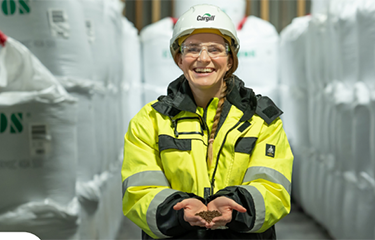Wayzata, Minnesota, U.S.A.-based Cargill has released its 2021 Aqua Nutrition and Sustainability Report, providing data on the company's operations over the past year.
Cargill is one of the world’s largest aquafeed producers, operating 19 aquaculture feed mills and 40 aquaculture-related facilities in 20 countries, including research and development centers.
Its feed production in 2021 exceeded 1.8 million tons, and focused on 12 species: shrimp, salmon, trout, striped bass, flounder, yellowtail, tilapia, pompano, barramundi, snakehead, crab, and alligator. Its salmon and shrimp feed accounted for three-quarters of its tonnage produced. Its production of feed for both cold- and warm-water species increased in 2021.
Also in 2021, Cargill launched its SeaFurther Sustainability Signature program, which assists farmers toward achieving net-zero emissions, with the overall goal of reducing the company's carbon footprint by 30 percent by 2030.
“With a growing global demand for seafood and the need for aquaculture to support it, there is an unprecedented demand on the sector to do more with less," Cargill said.
Also in 2021, Cargill furthered its adoption recycled pallets, eliminated the use of more than 160,000 plastic bags, and upgraded its plant equipment to ensure reductions in greenhouse gas emissions. The company also continued a partnership with FjordFrende to coordinate vessel movement and ship traffic to further reduce its greenhouse gas emissions.
“It is very gratifying that Cargill and Skretting’s collaboration, ‘Friends of the fjord’ has had an immediate impact, reducing CO2 emissions 25 percent in Norway. In addition, the shipping company that handles transport has improved on coordination of deliveries to further reduce fuel consumption and emissions,” Cargill North Sea Managing Director Fredrik Witte said.
Photo courtesy of Cargill







